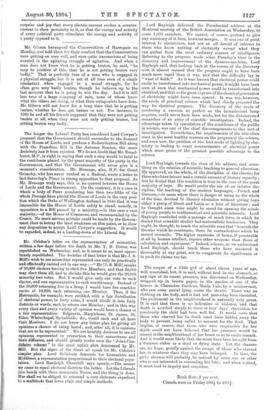Mr. Cobden's letter on the representation of minorities, written a
few days before his death to Mr. T. B. Potter, was republished on Wednesday, and, as it seems to us, most oppor- tunely republished. The doctrine of that letter is that Mr. J. S. Mill's wish to see minorities represented can only be practically and effectually carried out in one way :—" He [3. S. Mill] speaks of 50,000 electors having to elect five Members, and that 30,000 may elect them all, and to obviate this he would give the 20,000 minority two votes. But I would give only one vote to each elector, and one representative to each constituency. Instead of the 50,000 returning five in a lump, I would have five constitu- encies of 10,000, each returning one Member. Thus, if the Metropolis, for example, were entitled, with a fair distribution of electoral power, to forty votes, I would divide it into forty districts or wards, each to return one Member ; and in this way every class and every variety of opinion would have a chance of a fair representation. Belgravia, Marylebone, St. James, St. Giles, Whitechapel, Spitalfields, &c., would each and all have their Members. I do not know any better plan for giving all opinions a chance of being heard; and, after all, it is opinions that are to be represented." We are heartily desirous to see all opinions represented in proportion to their earnestness and their diffusion, and should greatly prefer even the " Joint-Can- didatee echeme " to the most unfair plan denounced by Mr. Mill. But the signs of the times all speak for Mr. Cobden's simpler plan. Lord Salisbury demands for Lancashire and Middlesex a representation proportioned to their electoral popu- lation. Lord Randolph Churchill says openly,—The sooner we come to equal electoral districts the better. Let the Liberals join hands with these democratic Tories, and the thing is done. Nor shall we be obliged to expound a very elaborate expedient to a multitude that loves plain and simple methods.


































 Previous page
Previous page